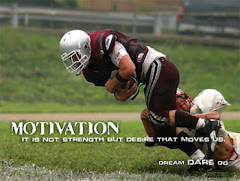
Some 15,000 people hit the Honda Center this week and found motivation, or at least that's what the "Get Motivated" seminar folks would like you to think.
And judging by the audience members who jumped around on a fern and flower encircled stage as "Surfin' USA" blared, some became believers.
But was the jubilation more like the euphoria you feel after some beers, only to wake up the next day and wonder where all the excitement went?
Or was the elixir served up through a blend of blasting music, pyrotechnics and a series of oddly matched speakers – Michael Phelps and Rudy Giuliani on the same stage – the real deal?
Searching for clues, I walked the aisles, climbed stairs and accosted people in hallways at the Honda Center.
After having attended a similar Tony Roberts seminar at the same venue several years ago, I was especially interested in discovering if there were any new miracles to motivate us during these tough economic times. To be honest, I hoped the answer was something exactly like the show at the Honda Center on Wednesday.
If the key to motivation resembled anything like "Get Motivated," we all could just start taking ourselves, our children and our colleagues to more rock concerts. And I like rock concerts.
Everyone I spoke to agreed that the speakers were good to great, Colin Powell getting the strongest reviews and my man, Michael Phelps, getting the weakest. (Sorry, Michael, but at least the haters said it was the interview format. Go it alone next time.)
But after that, the reviews were mixed. Some of those looking for motivation didn't find it. Some waited anxiously wondering when their favorite star would show while the promoters cleverly declined to post an itinerary. Others happily gravitated toward the second theme of the day: easy, fast money.
While the blue light special was clearly the $5 ticket that let you see and hear megawatt speakers, the real secrets to making a quick buck cost extra. Breaks between speakers, became marketing moments, as solicitors armed with pens and sign-up sheets roamed the aisles for people willing to sign up for workshops that promised paths to untold riches. Just step right out and step right up.
Audience members signed up in droves for the Financial Success workshops. It would be unfair not to mention we were offered an incredible deal because we were already inside the big tent – only $49 plus guest. We even were granted a "100% satisfaction guarantee
Sorry if you weren't there. You will miss out on learning "How to Get Out of Debt... Fast," "How to Slash Your Taxes by Up to 50%," "How to Buy Property Using Little to None of Your Own Money" and more.
Some in the audience learned the art of the deal faster than others.
"I'll give you my number," one thirtysomething said when I asked to call him the next day, "if you tell me who's on next."
I did. But he didn't pay up. A motivational speaker in the making?
Still, at the end of the day, most people in the audience just looked tired, though not as tired as the Will Call workers who told me they put in a 13-hour day to help pull off the spectacular event.
One audience member, Ryan Griffin, 34, from Placentia, woke up a day after the event and put it this way:
"I would say it's not easy to get motivated at one of those large events. In the moment, that day, it sounds great. But it's not like you can flip a switch and stay motivated forever."
Griffin allowed that the main speakers were worth the time and the price of admission, which was practically free. But the district sales manager for John Deere explained he finds motivation elsewhere – within himself and at work. And, rather than easy money or famous speakers, he talked of emotional connections to what he does and to other people.
Like many, Griffin faced major change last year. With degrees in irrigation and landscape architecture, he left a job in implementation for a career in sales. Yet he managed to stay within a field he is passionate about, saving precious water resources and similar environmentally friendly efforts.
"I'm doing something I love. I'm in it for the whole team, the planet if you will."
The other topic Griffin spoke about was similar to what Rick Belluzzo, former Microsoft president and CEO mentioned at the Honda Center: Keeping it fresh.
"He said to reinvent yourself," Griffin said. "He hit it right on the head. I'm not doing the same old thing every day."
He elaborated that he particularly enjoys helping others solve problems.
The magic of Griffin's approach to motivation is that it transfers to different jobs, different challenges. Yet it also fits what he is doing right now.
"If you're not passionate, the customer sees right through you," Griffin cautioned.
Passion. Love. Helping others.
You might not find them at a "Get Motivated" arena-style seminar – or you might.
But you certainly will find motivation following your heart, as Griffin did.
And, hopefully, down the line he'll end up taking his sons, now ages 3 and 5, to a rock concert anyway.
In the meantime, he can read my motivational columns. Only 75 cents.
Source


















